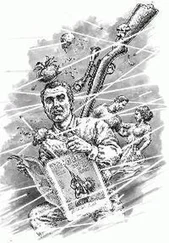Аврам Дэвидсон - Peregrine - primus
Здесь есть возможность читать онлайн «Аврам Дэвидсон - Peregrine - primus» весь текст электронной книги совершенно бесплатно (целиком полную версию без сокращений). В некоторых случаях можно слушать аудио, скачать через торрент в формате fb2 и присутствует краткое содержание. Год выпуска: 1971, ISBN: 1971, Издательство: New York : Walker, Жанр: sf_all, на английском языке. Описание произведения, (предисловие) а так же отзывы посетителей доступны на портале библиотеки ЛибКат.
- Название:Peregrine : primus
- Автор:
- Издательство:New York : Walker
- Жанр:
- Год:1971
- ISBN:0802755461
- Рейтинг книги:5 / 5. Голосов: 1
-
Избранное:Добавить в избранное
- Отзывы:
-
Ваша оценка:
- 100
- 1
- 2
- 3
- 4
- 5
Peregrine : primus: краткое содержание, описание и аннотация
Предлагаем к чтению аннотацию, описание, краткое содержание или предисловие (зависит от того, что написал сам автор книги «Peregrine : primus»). Если вы не нашли необходимую информацию о книге — напишите в комментариях, мы постараемся отыскать её.
Peregrine : primus — читать онлайн бесплатно полную книгу (весь текст) целиком
Ниже представлен текст книги, разбитый по страницам. Система сохранения места последней прочитанной страницы, позволяет с удобством читать онлайн бесплатно книгу «Peregrine : primus», без необходимости каждый раз заново искать на чём Вы остановились. Поставьте закладку, и сможете в любой момент перейти на страницу, на которой закончили чтение.
Интервал:
Закладка:
The red little eyes gleamed in the red firelight.
“Listen, King-son,” he countered, “wouldee bear sit in the woods?”
“Well. . .”
“Who you want kill?”
“Well. ..”
“Where he live?”
The other members of Hun Horde Number Seventeen may not have known even much dog-Latin, but their leader’s only semi-suppressed enthusiasm communicated its own message. They came slinking and gathering round about like wolves. Their tongues almost overlapped their lips. Likewise their eyes gleamed. And, remembering a lair he had briefly entered one winter hunt with his brother Austin, Peregrine decided that they even smelled like wolves.
“I want you to fall behind the boat,” he said. “I want you, though, to have out at least one scout who will always keep the boat in sight. I would like your main horde to keep out of sight as much as possible. Right now we are still- in hilly country, woods—but very soon the tilled places will start. I wish that you, King, will see to it that no raiding at all is done . . . not so much as a pigeon from a cote . . . don’t even burn a hay-stack. Will it be so?
Some dog-Latin some of the hordesmen certainly knew, for these harsh conditions produced a certain amount of restlessness in their ranks. But, their chief glancing up then and the fire glinting upon his cheeks where once long ago a red-hot iron had seared the flesh to kill the hair, the mere look itself was like a red-hot iron: and at that moment he was very King and Scourge indeed; and Peregrine thought that he looked, not like a wolf— Like a tiger.
AVRAM DAVIDSON
[ 115 ]
“So,” said Peregrine.
“ Very so,” said Attila the King
His new-made ally knew just where his thoughts were. “You meetee me. I meetee you. We make talkee-talkee. Not so?” “Even so.”
“ Very so,” said Attila the King. “Sunumabitch, yes.”
t + + +
Augustus said, ‘‘I confess that the presence of the Huns makes me somewhat unhappy. They are a singularly nonproductive people. I thought it wisest, back in Nimrunna, to conciliate them with pomps and ceremonies. But it is difficult to do that without a city at one’s immediate disposal. I suppose they did come in somew'hat handy today, floating this wretched tub off, ungodly costly though it was. However, I should like to be able to hope not to see them tomorrow.”
Peregrine said, “I can guarantee that we won’t.”
“You can? Good! How do you know? Oh. Oh ho. You arranged that, did you? Very good. How did you— Well, I shan’t ask that. Sent them back to raid and pillage Nimrunna, I suppose. What I was thinking of, myself.” He gave a thin, wheezing chuckle. “Well done. Very well done, in fact, General.”
“Thank you, Sire,” said Peregrine.
t f t t
Day after day the vessel ambled down the river, seeing no other. Now and then, slowly increasing in number, they saw the smoke of hearth-fires: but always afar off, as, where there were not hills by the bankside there were often bogs and swamps. And once, Matron Eudoxia, rousing herself from the comfortable doze which was her usual condition, flowed to the side and said that if she didn’t swear to Holy Wisdom, but if that there to the left didn’t look like a sudd! —and this, she explained, was a sort of conglomerate of land and water and vegetation to which the waterways of Nubia were inclined to be sogged and sometimes clogged and swamped with. But what with the warmth and
stillness, no one was inclined to pursue the matter.
Eugenius was all intent on piloting his ship through the mazy channels. Augustus sat upon his bags of bezants as though on a throne, dreaming dreams of glory and productive industry. Appledore had rediscovered the tattered pages first found in the junkyard of Ulrich the ironmonger, and alternatively frowned and mumbled as he slowly scanned them. Sister Pulchrituda, doubtless out of long, long habit, tended to the fire.
No one was moved to question Peregrine’s habit of leaving the boat for varying periods of time. Morning and evening, he met with Claud (and sometimes Philoxena) on the left bank; always, at noontime, he met with King Attila on the right. Claud had ceased to make any complaints about the heaviness of prongs, or, for that matter, about anything else. Attila, however—whose command of the common tongue was improving with use—had many complaints ... or, rather, one complaint, on which he rang changes.
“Bread and beef, bread and beef, and beef and bread: food for slabes eatee, for slabes, Boy, food. Givee man fine fillet tenyear-old stallion, with paprika sprinkle and rubbee garlic, puttee between horses and Hun and makee tender by ten-twennee mile gallop, ahah and ahah and yoy, Boy! Food fittee for eat! Fittee for eat, food!” And he smacked his cracked and chapped lips and licked the dust off them with a coated and gummy tongue. Howsomever, “All-same quiet,” he reported on the right bank. Curiously enough, on the left, Claude also mentioned that useful beast, the horse.
“That’s why I got the new clothes,” he explained, somewhat defensively. “The ones I had were only good enough for a thrall,” he said, “but when I explained to the farmer that my horse had been stolen with the real good ones in the saddle bags, he swallowed it—sold me these extra Sunday-go-to-market duds he had. So it occurred to me, This is it!’ ”
“This is what?” Peregrine queried.
“My cover, see? I’m a farmer from out of the district trying to locate my strayed or stolen horse. Couldn’t go around looking like it was me that’d run away, could I? I might be seized for a reward—”
Peregrine felt twinges of guilt. He had never given a thought as to how Claud was dressed, or how he might feel about how he
was dressed, or of anything of his thoughts or feelings. “Listen, Chief of Scouts,” he said, “as long as you stop short of purple, nobody on the staff cares how well you dress.”
“And furthermore, it’s an ideal way to get conversation started. You describe the animal, see—‘He’s a roan with a white stocking,’ as it might be. No, says Agricolus, he hasn’t seen any horse like that, but he tells you about some roans he has seen, then he mentions other horses with white stockings he’s seen. Next thing you know he starts talking about any suspiciouslooking strangers he’s seen .... Before you know it, you got a pretty good idea of all the movements going on in the district.”
Peregrine nodded. “That sounds like a sound way of going about it. Well. And what movements have been going on in the district, then?”
Claud, who had brightened, un-brightened. He looked away and kicked pebbles. “Well, as a matter of fact, no movements have been going on in the district,” he admitted. “But if there ever are, I bet you I get to hear about them!”
The General Staff was feeling slightly stale about events in general when he clambered aboard the Homoiousios once more. “Anything of interest in your old papyruses. Doctor Appledore?” he asked without much expectations.
“Oh, it’s all interesting, my boy, but on the whole it’s all inconclusive, too. The pages appear to have formed part of a sort of commonplace book, or codex of random notes, as kept by someone called either Epiglottis of Epizootic, or Epizootic of Epiglottis—interpreted one way. Interpreted another way, both words could form part of a treatise on veterinary medicine. And then there’s this phrase, which puzzled me for two whole days, Hunc nunc tibi bibi bubu pupu pipi tipi —but then I figured out that he was just testing his pen. And then, for example, there’s this. Tiberius expelled them from Rome because Chrestus was always inciting them to violence. And —”
Languidly interested, Peregrine said, “A mistake, clearly for Christus, I would suppose.”
Читать дальшеИнтервал:
Закладка:
Похожие книги на «Peregrine : primus»
Представляем Вашему вниманию похожие книги на «Peregrine : primus» списком для выбора. Мы отобрали схожую по названию и смыслу литературу в надежде предоставить читателям больше вариантов отыскать новые, интересные, ещё непрочитанные произведения.
Обсуждение, отзывы о книге «Peregrine : primus» и просто собственные мнения читателей. Оставьте ваши комментарии, напишите, что Вы думаете о произведении, его смысле или главных героях. Укажите что конкретно понравилось, а что нет, и почему Вы так считаете.






